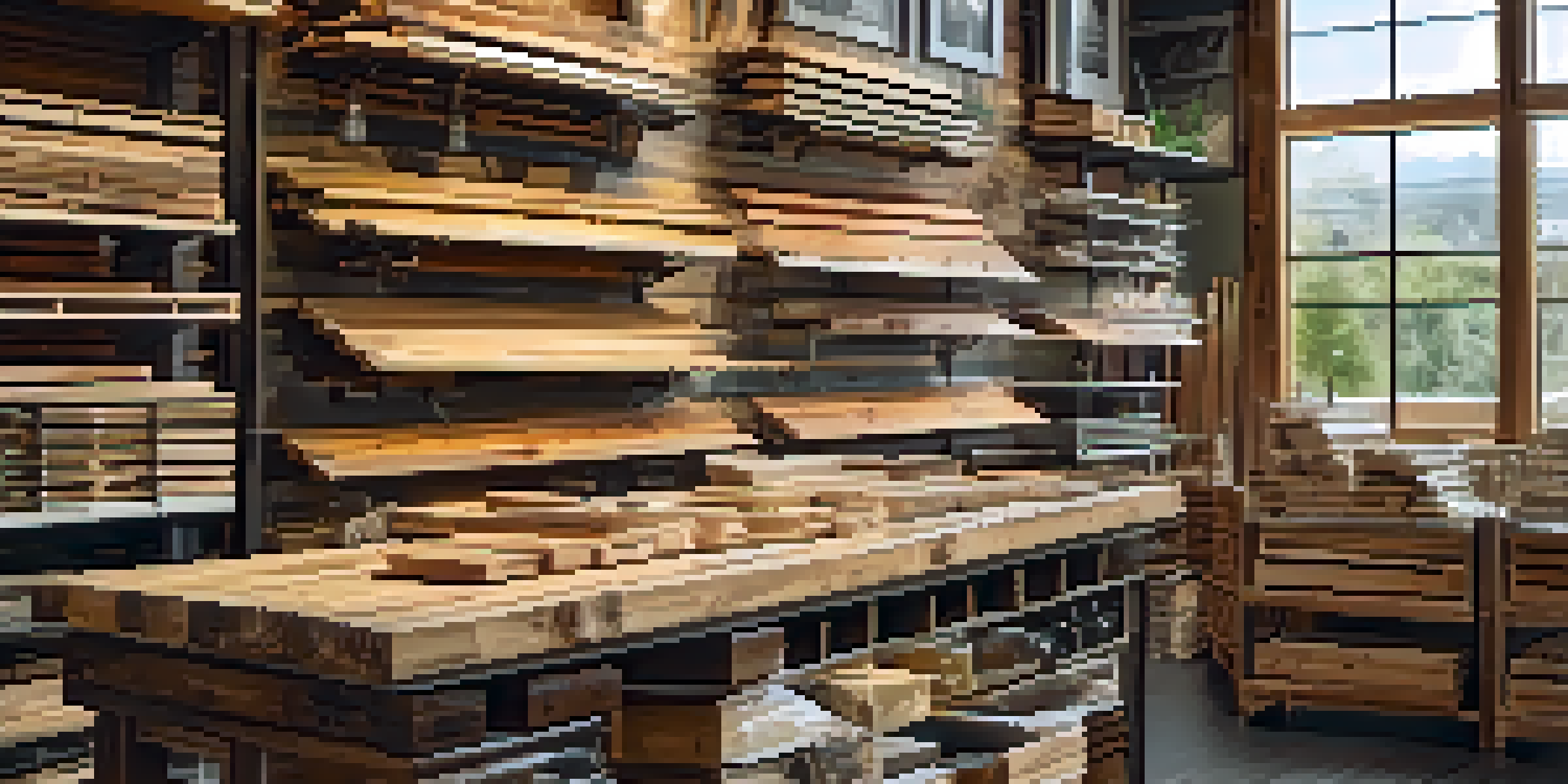How to Find Local Suppliers of Sustainable Building Materials

Understanding the Importance of Sustainable Materials
Sustainable building materials are crucial for reducing our environmental footprint. They not only minimize waste but also often come from renewable resources. By choosing these materials, you're contributing to a healthier planet, which is a win-win for everyone.
The greatest threat to our planet is the belief that someone else will save it.
Moreover, sustainable materials can enhance the energy efficiency of your building. For instance, using bamboo, which grows quickly and absorbs carbon dioxide, means you’re making a smart choice for both the environment and your energy bills. This is where the importance of sourcing locally comes into play.
Local suppliers can provide materials that are not only sustainable but also suited to your region's specific climate and conditions. By supporting these businesses, you're investing in your community and promoting local economies.
Researching Local Suppliers Online
The internet is a treasure trove of information when it comes to finding local suppliers. Start by using search engines with keywords like 'sustainable building materials near me' or 'eco-friendly suppliers in [your location].' This can yield a list of potential suppliers to explore.

Additionally, many websites specialize in connecting consumers with sustainable businesses. Platforms like Green Building Supply or EcoBuilding Bargains often have directories of local suppliers. These resources can save you time and help you find reputable vendors.
Choose Local Sustainable Suppliers
Sourcing materials from local suppliers not only supports the community but also ensures the products are suited to your region's climate.
Don’t forget to check social media platforms as well. Local businesses often showcase their products and services on Instagram or Facebook, making it easier for you to see what they offer and connect with them directly.
Visiting Local Hardware Stores and Lumber Yards
Sometimes the best way to find sustainable materials is to visit local hardware stores and lumber yards. Many of these establishments have started to stock eco-friendly options, and staff can often provide invaluable insights into sustainable choices.
Sustainability is not a trend, it's a responsibility.
When you visit, ask about their sustainable products. A knowledgeable salesperson can guide you to items made from recycled materials or sustainably sourced wood. This personal interaction can also lead to recommendations about other local suppliers.
Plus, being able to see and touch materials in person can make a big difference in your decision-making process. You’ll get a clearer sense of quality, texture, and how these materials might fit into your project.
Networking with Local Builders and Contractors
Connecting with local builders and contractors can be one of the most effective ways to find sustainable materials. These professionals often have established relationships with suppliers and can offer recommendations based on their experience.
Consider attending local building trade shows or home improvement expos to meet these professionals and learn about sustainable options. These events can provide a wealth of information and contacts that can lead you to the right suppliers.
Utilize Online Resources Effectively
Online platforms like Etsy and specialized directories can help you discover eco-friendly materials and reputable local suppliers.
Additionally, joining local community groups or online forums focused on sustainable building can open doors for networking. You might find someone willing to share their go-to suppliers and tips on sourcing materials sustainably.
Utilizing Online Marketplaces for Sustainability
Online marketplaces like Etsy or eBay can be surprising resources for sustainable building materials. Many artisans and small businesses sell reclaimed wood, recycled metal fixtures, and other eco-friendly products that can be perfect for your project.
These platforms allow you to filter your searches by location, helping you find items that are locally sourced. This not only supports smaller businesses but also reduces the carbon footprint associated with transporting materials.
While purchasing online, always check for reviews and seller ratings. This ensures you're getting quality products and supporting reputable suppliers.
Checking Certifications and Standards
When sourcing sustainable building materials, it's vital to check for certifications that verify a product's eco-friendliness. Look for labels like FSC (Forest Stewardship Council) or Cradle to Cradle, which indicate responsible sourcing and manufacturing practices.
Understanding these certifications can be a little tricky, but they provide assurance that the materials meet specific environmental and social responsibility criteria. This knowledge helps you make informed decisions and supports transparency in the industry.
Verify Certifications for Quality
Checking for certifications like FSC ensures that the materials you choose meet environmental and social responsibility standards.
Also, don’t hesitate to ask suppliers about their sourcing practices. A reputable supplier should be willing to provide information about the sustainability of their products and how they align with recognized standards.
Building Relationships with Suppliers
Once you've identified local suppliers, take the time to build relationships with them. This can lead to better pricing, exclusive product access, or even personalized service that can enhance your project experience.
Regular communication can help you stay updated on new sustainable materials or special promotions they might be offering. This is especially helpful if you're planning multiple projects over time.

Moreover, by establishing a rapport, you’re supporting local businesses and encouraging them to continue providing eco-friendly options in the future. It's a win-win that contributes to both your projects and the local economy.
Evaluating Your Options and Making a Choice
After gathering information from various sources, it’s time to evaluate your options. Consider factors such as cost, availability, and environmental impact when making your decision.
Create a pros and cons list for each supplier you’re considering. This can help clarify which suppliers align best with your sustainability goals and project requirements.
Ultimately, the goal is to choose suppliers that resonate with your values and contribute positively to your project. Taking the time to make the right choice will pay off in the long run, both for your project and the planet.